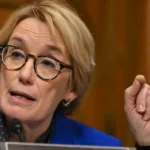Trump Claims US Doesn’t Need Canadian Energy or Cars, Threatens Tariffs. At the World Economic Forum, former US President Donald Trump stated that the United States does not need Canadian energy, vehicles, or lumber. Speaking via video link from Washington DC, Trump reiterated his threat to impose tariffs of up to 25% on Canadian imports, potentially starting by February 1, 2024.
Donald Trump suggested Canada could avoid these tariffs by “becoming a state” of the US, a comment that drew gasps from the audience. He criticized Canada as being “very tough to deal with” in trade negotiations, claiming the US has a trade deficit with its northern neighbor of $200–$250 billion, though official estimates for 2024 put the deficit at $45 billion, primarily driven by energy imports.
Canada, heavily reliant on US trade—75% of its exports head south—has vowed to respond with “dollar-for-dollar” countermeasures, including potential taxes or embargoes on energy exports. Canadian Prime Minister Justin Trudeau emphasized that Canada’s goal is to avoid tariffs but warned of a gradual escalation if levies are imposed.
Economists argue that the US depends on Canadian energy for its security. In 2024 alone, Canadian energy exports totaled $170 billion. Additionally, the North American auto industry relies on integrated supply chains where parts cross borders multiple times during vehicle assembly.
Trump tied his tariff threats to border security, urging Canada to increase efforts at the shared border. He encouraged businesses to manufacture in the US to avoid tariffs, framing them as essential to protecting American jobs, growing the economy, and raising tax revenue.
Canadian officials are lobbying American lawmakers to avert the tariffs, promoting Canada as a reliable trade partner and secure source of critical minerals. Trudeau, however, ruled out extreme measures, declaring, “not a snowball’s chance in hell” of Canada joining the US as a state.
Trump’s administration has ordered a review of US trade relationships for unfair practices, with results expected by April 1, 2024.














